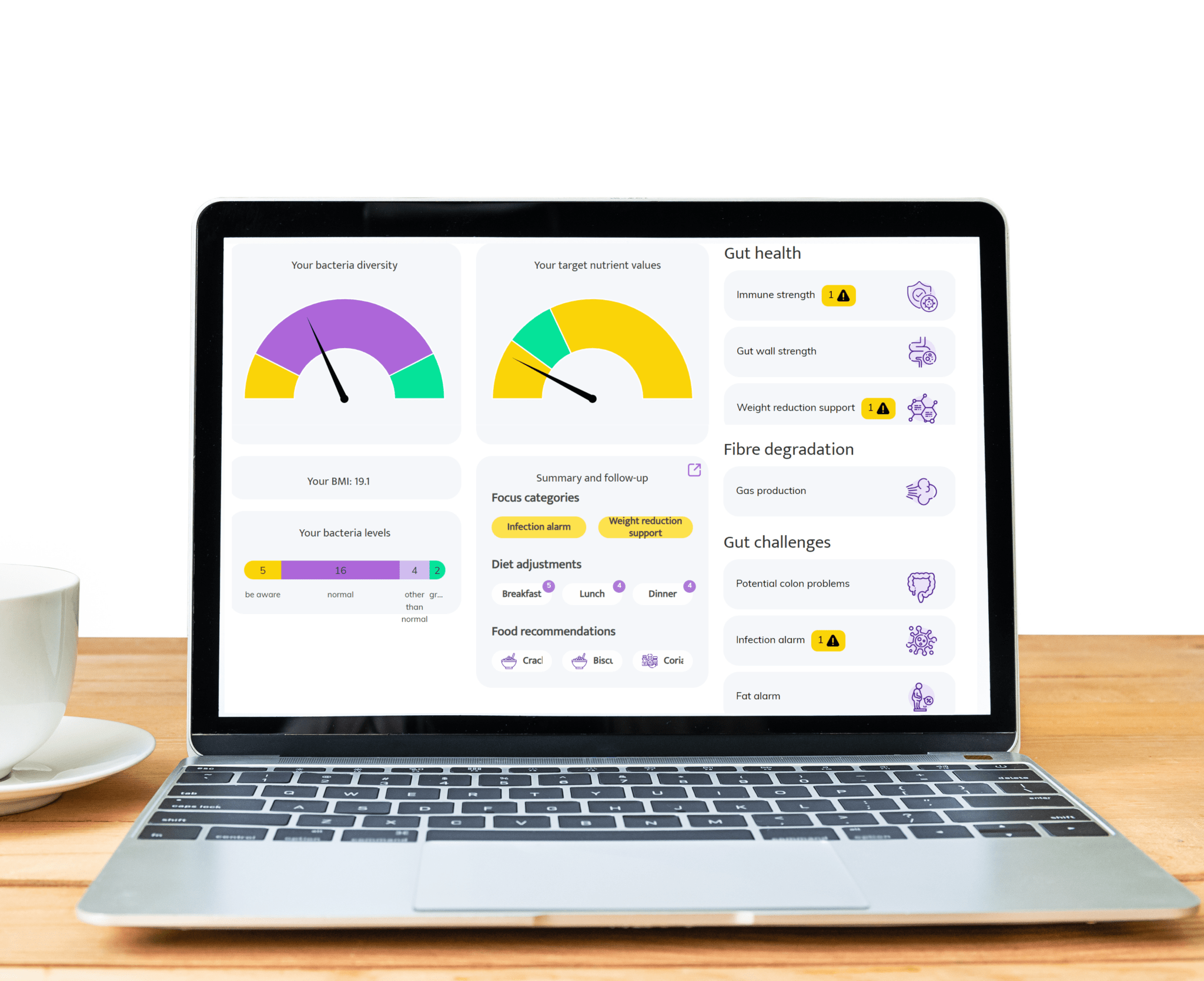Less Stress Through a Healthy Gut!


How can we help you reduce stress?
-
🧠 Stress Molecule
Did you know that your brain and gut communicate with each other constantly? As a result, an unhealthy and inflamed gut contributes to an increased level of the stress hormone, cortisol. More cortisol = more stress. The gut has a powerful influence on your brain and can even manipulate the feeling of stress!
-
🦠 Stressed Bacteria
There are certain “good bacteria” in the gut that have been shown to reduce symptoms of stress. They produce various molecules (such as GABA) and send out signals that help reduce stress. These bacteria also decrease inflammation and improve your immune system. A happy gut plays a key role in stress reduction!
-
🔬Team of Experts
Not only do we use the most accurate and reliable testing methods, but we also have a team of experienced dietitians, gut health specialists, and scientists. They combine their knowledge and skills, spending hours on creating the most accurate, evidence-based test and recommendations for you.
-
✨ Quick & Easy
Taking care of your gut has never been easier! Our gut microbiome analysis can be done in the comfort of your own home with our easy-to-use testing kit. Simply collect your sample and send it back to us. We'll take care of the rest. Plus, we offer free shipping to make the process hassle-free.
-
🧬 Science-Based
With our competitive pricing, you get the best bank for your buck! Our test is based on cutting-edge scientific research and DNA testing technology. We use the most accurate methods to analyze your unique gut microbiome composition, providing you with reliable and actionable insights.
-
🥑 Personalised Nutrition
Our analysis goes beyond just identifying the bacteria in your gut microbiome. We offer nutrition advice, “do’s and don’t”, based on your specific results. This means that you can immediately start supporting your gut health as soon as you receive your results!

More information about the relationship between Gut Health and Stress
How both impact each other.
Why gut health is important for stress and the other way around
Why gut health is important for stress and the other way around
Gut health and stress are deeply interconnected, forming a bidirectional relationship that significantly impacts both physical and mental well-being. Here are some compelling reasons why gut health is important for stress, and how stress, in turn, influences gut health:
1. Gut-Brain Axis:
- The gut-brain axis refers to the communication pathway between the gut and the brain. This connection involves both neural (via the vagus nerve), endocrine, and immune system pathways. The gut produces neurotransmitters like serotonin (about 90% of the body’s serotonin is found in the gut), which play a crucial role in regulating mood, stress response, and mental health. If the gut is unhealthy, it can impair this communication, leading to higher levels of stress and anxiety.
2. Microbiota and Mental Health:
- The gut microbiome, the trillions of bacteria and other microorganisms living in the gut, significantly influences stress responses and emotional regulation. A balanced gut microbiome can help modulate the body’s reaction to stress, while an imbalanced microbiome (dysbiosis) has been linked to increased anxiety, depression, and stress sensitivity.
- Certain gut bacteria produce short-chain fatty acids (SCFAs) like butyrate, which have anti-inflammatory effects and can influence brain function and mood regulation. An unhealthy microbiome may decrease SCFA production, exacerbating the negative impact of stress on the body.
3. Immune System and Inflammation:
- The gut is a major part of the body's immune system. When the gut is unhealthy or imbalanced, it can increase systemic inflammation, which is associated with higher stress levels and a lower threshold for stress. Chronic low-grade inflammation has been shown to worsen mental health disorders, including depression and anxiety.
- Conversely, stress can activate the body's stress-response system, leading to the release of pro-inflammatory cytokines that can disrupt gut function. This creates a vicious cycle where gut health influences stress, and stress exacerbates gut problems.
4. Cortisol and Digestive Function:
- When the body experiences stress, it releases the hormone cortisol. Cortisol affects multiple body systems, including the digestive system. Chronic stress can impair the gut lining, contribute to leaky gut syndrome, and disrupt the digestion and absorption of nutrients. These changes can exacerbate existing gut conditions, such as irritable bowel syndrome (IBS), and lead to further stress.
- Elevated cortisol levels also reduce the growth of beneficial gut bacteria, further promoting dysbiosis and contributing to stress.
5. Gut-Related Disorders and Mental Health:
- Gut disorders like IBS, Crohn’s disease, and other functional gastrointestinal issues are often comorbid with mental health conditions such as anxiety and depression. The discomfort, pain, and unpredictability of digestive issues can increase psychological stress, while stress itself can worsen gastrointestinal symptoms.
- Moreover, poor gut health can lead to nutrient deficiencies (such as those in magnesium, zinc, and B vitamins), which are important for brain function and mood regulation. This can further impair the body’s ability to cope with stress.
6. Neurotransmitter Regulation:
- Gut health directly influences the production and regulation of key neurotransmitters like serotonin, dopamine, and GABA, which affect mood and stress responses. An imbalance in the gut microbiome can lead to imbalances in these neurotransmitters, contributing to feelings of anxiety, depression, and heightened stress reactivity.
- For example, GABA is an inhibitory neurotransmitter that helps to calm the nervous system, while serotonin plays a role in mood regulation. An unhealthy gut may lead to a reduction in the synthesis of these critical chemicals, thereby amplifying stress.
7. Gut Health and Sleep Quality:
- Stress and gut health also influence sleep quality, which in turn affects the body’s ability to manage stress. An unhealthy gut can impair sleep by disrupting the production of sleep-regulating hormones like melatonin. Stress can also interfere with sleep by elevating cortisol levels at night, disrupting circadian rhythms, and exacerbating gut discomfort. Poor sleep then makes the body more vulnerable to stress, setting off another cycle of stress-gut interactions.
How Stress Affects Gut Health
How Stress Affects Gut Health
1. Disruption of Gut Motility:
- Stress can alter gut motility, leading to either diarrhea or constipation. The autonomic nervous system, which is responsible for the body's "fight or flight" response, also regulates the gut. When stress activates this system, it can disrupt normal digestive processes, leading to symptoms like bloating, cramping, and irregular bowel movements.
2. Increased Gut Permeability (Leaky Gut):
- Chronic stress can contribute to the development of leaky gut syndrome, where the gut lining becomes more permeable, allowing toxins, undigested food particles, and harmful bacteria to enter the bloodstream. This can trigger inflammation throughout the body, contributing to both gut and mental health issues.
3. Reduction in Digestive Enzymes and Gastric Acidity:
- Stress can reduce the production of digestive enzymes and gastric acid, impairing the body’s ability to break down and absorb nutrients properly. This can lead to malnutrition, gut discomfort, and increased susceptibility to gut infections, all of which can contribute to feelings of stress and anxiety.
4. Altered Gut Microbiome Composition:
- Stress can also alter the composition of the gut microbiome, leading to a decrease in the diversity of beneficial bacteria and an overgrowth of harmful microbes like pathogenic bacteria and fungi. This imbalance can impair digestion, increase inflammation, and influence the body’s stress response.
The relationship between gut health and stress is complex and reciprocal. Gut health can directly affect the body’s stress levels by influencing the brain’s emotional and cognitive functions, as well as by modulating inflammation, gut motility, and neurotransmitter production. On the other hand, stress can compromise gut health by disrupting digestion, immune function, and microbiome balance. This creates a feedback loop where poor gut health can lead to increased stress, and chronic stress can further impair gut health. Addressing both factors is crucial for promoting overall physical and mental well-being.
Which diet should you follow to reduce stress?
Which diet should you follow to reduce stress?
To reduce stress, it’s important to adopt a diet that supports both physical and mental health, focusing on foods that help regulate stress hormones, promote a balanced gut microbiome, reduce inflammation, and stabilize blood sugar levels. Here’s a breakdown of a stress-reducing diet:
1. Eat More Whole, Nutrient-Dense Foods
- Whole Grains: Foods like oats, quinoa, brown rice, and whole wheat provide a slow-releasing source of complex carbohydrates, which can help regulate blood sugar levels and promote a steady release of serotonin, the "feel-good" neurotransmitter.
- Leafy Greens and Vegetables: Spinach, kale, broccoli, and Swiss chard are rich in folate, which helps regulate mood and stress responses. Vegetables are also high in antioxidants, which combat oxidative stress.
2. Include Omega-3 Fatty Acids
- Fatty Fish: Salmon, mackerel, sardines, and herring are rich in omega-3 fatty acids, which have anti-inflammatory properties and can help reduce the production of stress hormones like cortisol. Omega-3s also improve brain function and mood regulation.
- Flaxseeds, Walnuts, and Chia Seeds: These plant-based sources of omega-3s can be added to smoothies, salads, or oatmeal.
3. Consume Foods Rich in Magnesium
- Magnesium is a vital mineral that helps relax muscles, calm the nervous system, and regulate the body’s stress response. Magnesium deficiencies are often linked to increased stress and anxiety.
- Magnesium-Rich Foods: Spinach, almonds, pumpkin seeds, avocados, and dark chocolate (70% cocoa or higher) are excellent sources of magnesium.
4. Prioritize High-Quality Protein
- Lean Proteins like chicken, turkey, tofu, lentils, chickpeas, and eggs are rich in amino acids, which help produce serotonin and dopamine, two key neurotransmitters involved in mood regulation and stress reduction.
- Tryptophan-rich foods (found in turkey, seeds, and nuts) can help boost serotonin levels, enhancing feelings of relaxation and well-being.
5. Incorporate Probiotic-Rich Foods
- Gut health plays a significant role in managing stress. Probiotics found in fermented foods help balance the gut microbiome, which in turn can improve mood and reduce stress.
- Probiotic-Rich Foods: Yogurt, kefir, kimchi, sauerkraut, miso, and kombucha are great options. These foods can enhance the gut-brain connection and help reduce anxiety.
6. Consume Antioxidant-Rich Foods
- Chronic stress increases oxidative stress in the body, leading to cellular damage. Antioxidants neutralize these free radicals and support the body’s ability to manage stress.
- Antioxidant-Rich Foods: Berries (blueberries, strawberries, raspberries), green tea, dark chocolate, oranges, tomatoes, and red bell peppers are all high in antioxidants and vitamin C, which helps combat the physical effects of stress.
7. Hydrate Properly
- Dehydration can increase stress and anxiety levels, so staying hydrated is essential for stress management. Drink water, herbal teas (e.g., chamomile, peppermint, or lemon balm), and avoid excessive amounts of caffeine or sugary drinks.
- Caffeine can increase cortisol levels and may exacerbate feelings of stress, so limiting caffeine consumption (especially in the afternoon and evening) can help improve sleep and reduce anxiety.
8. Vitamin C-Rich Foods
- Vitamin C is known to lower cortisol levels and protect the body from the damaging effects of stress. It also supports immune function, which can be weakened by chronic stress.
- Vitamin C-Rich Foods: Citrus fruits (oranges, grapefruits, lemons), kiwi, strawberries, and red bell peppers are excellent sources.
9. Herbs and Adaptogens
- Adaptogens are plants or herbs that help the body adapt to stress and maintain balance. They are believed to modulate the body’s stress response by supporting adrenal function and regulating cortisol levels.
- Adaptogenic Herbs: Ashwagandha, rhodiola, holy basil, licorice root, and schisandra may help reduce the physiological effects of stress. These can be consumed in tea or supplement form.
- Chamomile, lavender, and lemon balm are calming herbs that can be consumed as teas to help soothe the nervous system.
10. Avoid Processed Foods and Refined Sugars
- Processed foods, refined sugars, and junk food can cause blood sugar spikes and crashes, leading to mood swings and heightened stress. These foods also often contain additives and unhealthy fats that can exacerbate inflammation and disrupt the gut microbiome.
- Try to limit or avoid foods like sugary snacks, fried foods, fast food, and artificial additives. Instead, focus on whole, nutrient-dense foods that provide long-lasting energy and promote balance.
Can you give an example of a Stress-Reducing Meal Plan?
Can you give an example of a Stress-Reducing Meal Plan?
Breakfast:
- Oatmeal topped with blueberries, chia seeds, and a handful of walnuts.
- A cup of green tea or chamomile tea.
Lunch:
- Grilled salmon (or tofu for a plant-based option) on a spinach salad with avocado, tomatoes, pumpkin seeds, and a drizzle of olive oil and lemon.
- A side of kimchi or sauerkraut for gut health.
Snack:
- A handful of almonds and dark chocolate (70% cocoa or higher).
Dinner:
- Grilled chicken breast (or lentils for a plant-based option) with quinoa and a side of steamed broccoli and sweet potatoes.
Evening:
- Chamomile tea or lemon balm tea to wind down.
What are Lifestyle Tips to Complement the Stress-Reducing Diet?
What are Lifestyle Tips to Complement the Stress-Reducing Diet?
Exercise Regularly: Physical activity releases endorphins, which naturally lower stress levels.
Practice Mindfulness: Meditation, yoga, or deep breathing exercises can help activate the body’s relaxation response.
Get Enough Sleep: Aim for 7-9 hours of quality sleep each night to ensure proper recovery from stress.
Stay Socially Connected: Building supportive relationships helps buffer against stress and improves overall mental health.
Can the gut microbiome influence how the body responds to stress?
Can the gut microbiome influence how the body responds to stress?
Yes! The gut microbiome interacts with the brain through the gut-brain axis, a complex communication network involving hormones, immune signaling, and neural pathways. A healthy microbiome can help modulate the body’s stress response, while an imbalanced microbiome may lead to heightened stress sensitivity and emotional dysregulation.
What role do gut bacteria play in managing stress?
What role do gut bacteria play in managing stress?
Certain beneficial bacteria produce neurotransmitters like serotonin, which helps regulate mood and anxiety levels. A healthy gut microbiome supports the production of these molecules, contributing to a balanced stress response. Imbalances, on the other hand, can disrupt these processes, potentially leading to increased stress and anxiety.
How does gut health affect the production of stress-related hormones?
How does gut health affect the production of stress-related hormones?
The gut microbiome influences the production of stress hormones like cortisol. Imbalances in the microbiome may lead to higher cortisol levels, which can intensify stress and anxiety. A healthy gut microbiome helps regulate these hormones and supports the body’s ability to manage stress more effectively.
Can an unhealthy gut microbiome make stress worse?
Can an unhealthy gut microbiome make stress worse?
Yes. When the microbiome is out of balance, it can increase inflammation and alter the brain’s function, making it harder to cope with stress. Chronic stress, in turn, can further disrupt the microbiome, creating a vicious cycle of heightened stress and poor gut health.
How does stress impact the gut microbiome?
How does stress impact the gut microbiome?
Chronic stress can lead to changes in the composition of the gut microbiome, potentially reducing the diversity of beneficial bacteria. This imbalance can promote gut inflammation, digestive discomfort, and even affect the brain’s emotional regulation, making stress more difficult to manage.
What are the signs that your gut microbiome might be affecting your stress levels?
What are the signs that your gut microbiome might be affecting your stress levels?
Symptoms include frequent digestive issues (e.g., bloating, constipation, or diarrhea), mood swings, heightened anxiety, difficulty relaxing, or trouble sleeping. If stress is persistent or worsens with gut discomfort, it could suggest a connection between gut health and stress.
Can improving gut health reduce stress?
Can improving gut health reduce stress?
Yes! By restoring balance to the gut microbiome through diet, probiotics, prebiotics, and lifestyle changes, you may experience better stress management, improved mood, and reduced anxiety. A healthy gut helps regulate mood, enhances resilience to stress, and may improve your overall mental health.
Can probiotics help with stress?
Can probiotics help with stress?
Some studies suggest that probiotics, which contain live beneficial bacteria, may help reduce stress and anxiety. They may promote a healthy gut microbiome, improve gut-brain communication, and support the production of mood-regulating neurotransmitters. However, more research is needed to understand the full scope of probiotics’ effects on stress.
Is there a direct link between gut dysbiosis and anxiety or depression?
Is there a direct link between gut dysbiosis and anxiety or depression?
Yes, research suggests that an imbalanced microbiome (dysbiosis) may contribute to anxiety and depression by influencing the production of neurotransmitters and inflammation. While the connection is complex and still under study, gut dysbiosis is considered a contributing factor to mood disorders.
Can gut health impact cognitive function and how we think under stress?
Can gut health impact cognitive function and how we think under stress?
Yes. An imbalanced gut microbiome may affect brain function and cognitive performance, making it harder to think clearly or focus during stressful situations. A healthy gut microbiome supports better cognitive function, decision-making, and emotional regulation.